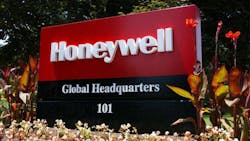Is Honeywell a Buyer or a Seller? Maybe It’s Both
What’s Honeywell up to now?
No sooner had investors gotten used to the idea that the industrial giant’s appetite for acquisitions had grown — by a lot — than news arrived that the company has been shopping around one of its businesses.
Honeywell has explored selling its building solutions division, which makes fire-safety and other security systems, the Wall Street Journal reported Wednesday. It’s not yet clear whether a sale of the unit would be instead of, or in conjunction with, the company’s $100 billion-plus pursuit of United Technologies — the news of which made a splash in M&A circles earlier this week. The good news for Honeywell shareholders is that there’s value to be created either way.
Several of the bigger industrial deals of late have centered on companies that operate in fire security and safety and have a similar business profile to the division Honeywell is earmarking for a possible sale. Johnson Controls is merging with Tyco International — which makes sprinklers and fire-protection systems — and private equity firm Apollo Global Management is buying home-security monitor ADT. Both targets are commanding high valuations.
The implied exchange ratio in Johnson Controls’ deal with Tyco values the latter at about $16 billion including debt. While the premium to Tyco’s stock price is low, the purchase price suggests an Ebitda multiple of about 13, compared with a median of 11 for other big industrial and security-services deals in the last few years. Apollo is paying a 56% premium for ADT — a bump that appears all the more lofty given the fact that the company’s shares had been slumping for years as it struggled to retain customers.
Those kinds of numbers have to be attractive for any company sitting on a security business. At Honeywell, building controls is a smaller part of its business — accounting for about 12% of its total revenue — but that could make it easier to sell. The company could get $3 billion to $4 billion for the asset it’s looking to sell, the Journal reported. That money could then be returned to shareholders or spent on acquisitions to bolster other parts of the company.
With Johnson Controls and Tyco occupied with their merger, it’s safe to assume both are out of the running as a buyer for Honeywell’s business. But it should attract interest from other industrial companies. In fact, here’s a crazy idea: maybe United Technologies would be one of them.
CEO Greg Hayes has said a merger with Honeywell “ain’t gonna happen” because of insurmountable antitrust objections. But with the company’s shares trading more than 10% below what Honeywell was reportedly offering, he’s under pressure to prove he can create value on his own.
Not too long after Hayes officially took the CEO job at United Technologies, questions started bubbling up as to whether the company was too big to grow and if it should split its aerospace operations from the building and industrial systems businesses. Why not buy Honeywell’s business, pair it up with what United Technologies has, and spin off the whole thing? That would give investors something to be excited about — without costing Hayes control of United Technologies.
If Honeywell does persist in its pursuit of United Technologies, it could help thwart antitrust objections to such a mega-merger by pairing the acquisition with a mega-breakup, similar to what Dow and DuPont are doing. Testing the waters now could be a good gauge of interest for an eventual sale or spinoff of a combined Honeywell and United Technologies building-controls business.
How exactly a sale of Honeywell’s building solutions business might play out is still unclear, but it gives the company another tool in its effort to build and break its way to keeping shareholders happy.
By Brooke Sutherland
